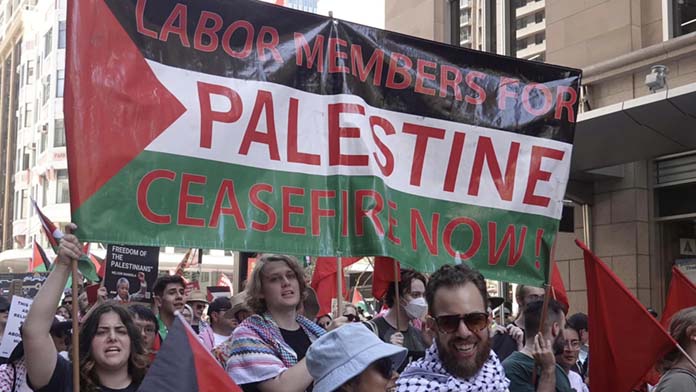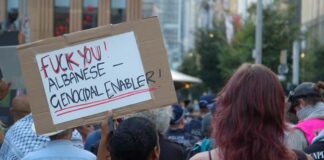Supporters of Palestine are rightly horrified by Albanese’s support for Israel as it continues to annihilate Gaza.
The ALP has a long history of support for Israel. Labor’s “Doc” Evatt, as Foreign Minister and President of the UN General Assembly, was one of the leading architects of the 1947 plan for the partition of Palestine.
In 1978, Labor leader Bill Hayden joined Malcolm Fraser at Camp David to celebrate the Egypt-Israel peace agreement, saying there, “My party feels a keen sense of involvement in the future integrity of an Israeli state.”
Bob Hawke, a staunch Zionist, first visited Israel in 1971 as president of the ACTU, where he described his meeting with then-Israeli Prime Minister Golda Meir as “life-changing”.
But since the war on Gaza began 40 Labor branches have passed motions calling for a ceasefire and four Labor MPs have attended pro-Palestine rallies. Labor-controlled Canterbury-Bankstown Council voted to fly the Palestinian flag until a ceasefire is declared.
Even former Labor leaders such as Bob Carr and Paul Keating have condemned Israel’s war.
This raises the question of how the campaign for Palestine should relate to supportive Labor members and MPs.
Some activists argue that pro-Palestine Labor Party members should not be welcome in the movement unless they leave the party.
So far the Palestine Action Group has voted to exclude Labor speakers from the platform at their weekly rallies in Sydney. Many on the left, including the Greens, say that Labor is essentially the same as the Liberal Party.
But Labor MPs who speak out and break with Albanese and the Labor leadership’s position increase the political pressure on the Labor government over Palestine. More internal dissent makes it harder for the government to continue supporting Israel.
Palestine activists should encourage Labor members to support our demands and seek to draw them into the movement.
The involvement of dissident Labor MPs on speaking platforms will build the movement’s power through drawing in people who still look to Labor as a progressive force and are disappointed by its stance on Palestine.
Demanding that Labor members resign from the party as a condition of involvement will simply cut these people off from the campaign and weaken it. They are more likely to be won to the need for protest and action outside of parliament, and potentially pulled to the left, and out of the Labor Party, if they are welcomed into the wider movement.
Mass movements in Australia that have brought change, like the anti-Vietnam War, anti-uranium and women’s and Aboriginal rights movements, have always involved large numbers of Labor members and supporters. Rank-and-file Labor and union members have often challenged the leadership or party policy, as they did on Labor’s support for conscription in World War One or the Vietnam War in the 1960s.
Divided party
The existence of starkly conflicting views within one party is because Labor, like all social-democratic parties, is a contradictory force.
Labor is pulled in two directions, between its working class base on one hand and its desire to manage capitalism on the other. Labor, particularly when it is in government, consistently prioritises the profits and needs of the ruling class.
This explains why Albanese has gone from speaking at pro-Palestine rallies 20 years ago to now fervently supporting Israel, whose role as watchdog state in the Middle East is so crucial to the alliance of Western imperial powers, of which Australia is a part.
Labor’s support base among workers and sections of the left differentiates it from the Liberal Party, which is an out-and-out party of the rich. When Peter Dutton makes racist comments or calls for even greater support for Israel, there is virtually no disagreement from Liberal Party ranks.
Support for Labor among workers has undoubtedly diminished since the 1980s and Albanese won government with the lowest primary vote for Labor since 1934.
But there is still a class divide between the average Labor and Liberal voter. An opinion poll in 2021 showed a clear preference for Labor among lower income earners, and the opposite among the wealthy.
Crucially, unions still control 50 per cent of the votes at party conferences, meaning Labor has an organic connection with the organised working class.
Unionists for Palestine has shown the possibility of bring rank-and-file union members into the Palestine movement and pushing the leadership of individual unions, including the Teachers Federation and the Labor-affiliated ASU, to support the campaign.
Since many trade union officials and activists are Labor Party members, this also increases the pressure on the Labor party from within.
Rather than excluding Labor members, activists must build a united front and as broad a movement as possible if we are serious about ending Israel’s war and liberating Palestine.
By Caitlin Doyle






